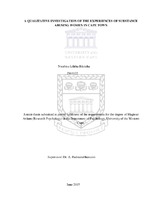A qualitative investigation of the experiences of substance abusing women in Cape Town
Abstract
This aim of this study was to investigate the life experiences of substance abusing women participating in a substance abuse treatment programme in the Cape Town area. Much of the research that has been conducted on this topic has been quantitative and therefore removed from the context of lived experience. The current study thus aimed to fill this gap in the literature by using a qualitative methodology to explore women’s own accounts of substance use and how they make sense of these experiences, their trajectory towards substance abuse as well as their motivation for treatment. A qualitative research design was employed, drawing on the interpretive framework which seeks to understand how people make sense of their experiences. Six participants were recruited from a substance abuse treatment centre in Cape Town and data was collected using semi-structured interviews and analysed using Interpretive Phenomenological Analysis (IPA). Guba and Lincoln’s guidelines for ensuring rigor in qualitative studies were followed and the ethical principles of informed consent, non-maleficence, authenticity of data and anonymity were maintained throughout the study. The study found that partner substance use and psychological pain experienced by the women played a motivating role in their substance use. In addition, the reconstruction of one’s own identity, perceptions of motherhood and mending relationships were found to be key elements in women’s motivation for recovery.

